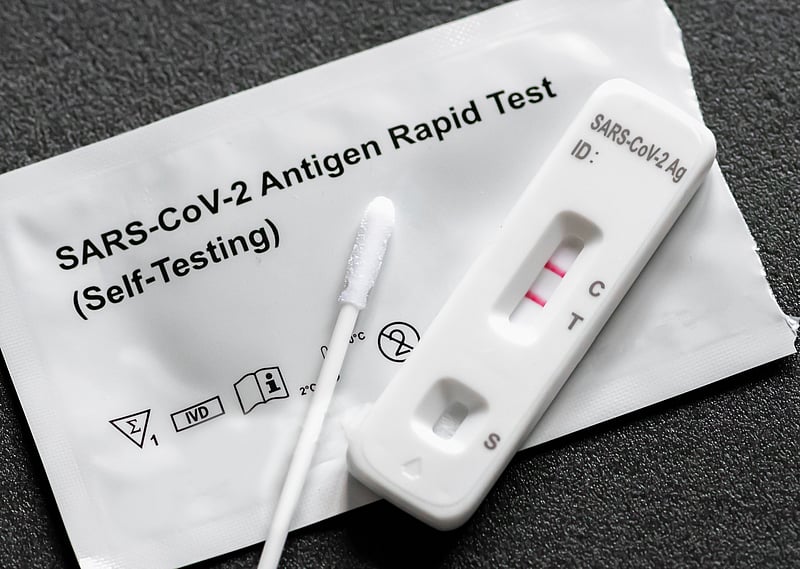Manténgase sano!

- Steven Reinberg
- Posted October 10, 2023
COVID Might Raise Odds for Immune Disorders Like Crohn's, Alopecia
In rare cases, some patients may develop an autoimmune disease following a bout of COVID, Korean researchers report.
Conditions such as alopecia (hair loss), psoriasis, vitiligo (white skin patches), vasculitis (inflammation of blood vessels), Crohn's disease, ulcerative colitis, rheumatoid arthritis, adult-onset Still's disease (painful skin rash), Sjogren's syndrome (autoimmune disease), ankylosing spondylitis (spinal arthritis) and sarcoidosis (enlarged lymph nodes) can all be triggered by COVID-19 infection, according to the new report.
COVID-19 patients faced 12% to 74% higher odds for various types of alopecia, a tripled risk for vasculitis, 68% higher odds for Crohn's and 59% higher odds for sarcoidosis, the study found.
"Our findings highlight a significant association between SARS-CoV-2 infection and the development of autoimmune and auto-inflammatory disorders. This emphasizes the need for a comprehensive medical approach that encompasses both the acute manifestations and potential long-term complications of COVID-19," said lead researcher Dr. Sung Ha Lim, from the department of dermatology at Yonsei University's Wonju College of Medicine in South Korea.
"Given the significant global population of COVID-19 survivors, vigilant monitoring for emergent autoimmune diseases is paramount for timely intervention," she added.
This study underlines previous findings, said Dr. Marc Siegel, a professor of medicine at NYU Langone Medical Center in New York City.
"It is likely because when you defend yourself against COVID, interferons are produced which trigger inflammation, which can then trigger auto-antibodies against the body's organs, muscles or nerves, especially when you have a tendency towards that disease in the first place," Siegel noted.
For the study, Lim and her colleagues collected data on nearly 355,000 men and women who had COVID-19. These patients were compared with more than 6 million people who didn't have COVID-19.
Lim added that the severity of the COVID infection, as well as being unvaccinated, upped the odds of developing these conditions.
"Unvaccinated individuals exhibited a greater risk for certain autoimmune diseases, including alopecia areata, alopecia totalis and Crohn's disease," she said.
The report was published online Oct. 6 in JAMA Network Open.
Another expert isn't surprised that COVID-19 can trigger autoimmune diseases.
"As all of us know, COVID impacts so many aspects of the human body," said Dr. Bruce Hirsch, an infectious disease specialist at Northwell Health in Manhasset, N.Y. "It's not surprising that COVID hit us the way it did without us having any pre-existing immune experience or immune protection, and it had a profound impact on the immune system."
Hirsch noted this reaction is not unique to COVID-19. "We do see post-infectious autoimmune conditions. We do see this with other types of infections," he said. "This is not limited to COVID."
The good news is that the population is becoming more experienced in terms of immune system recognition with COVID-19 because of cases and vaccinations, Hirsch said.
Not only that, "I think the risk to any specific individual of an autoimmune condition like the ones that were described is very, very low. We're talking a couple out of 100,000, much below 1%," Hirsch said.
The best overall protection for COVID-19 is getting vaccinated, he advised.
"It's our evolving immune experience that's going to reduce all these different risks and reduce the impact on us," Hirsch said. "I think one way of getting more immunologic experience without getting COVID is the COVID vaccines. I do think that taking additional COVID vaccines as they become available, including the current booster, is something that will be helpful."
More information
For more on COVID-19, head to the U.S. Centers for Disease Control and Prevention.
SOURCES: Sung Ha Lim, MD, department of dermatology, Yonsei University Wonju College of Medicine, Wonju, Republic of Korea; Bruce Hirsch, MD, infectious disease specialist, Northwell Health, Manhasset, N.Y.; Marc Siegel, MD, professor, medicine, NYU Langone Medical Center, New York City; JAMA Network Open, Oct. 6, 2023, online

